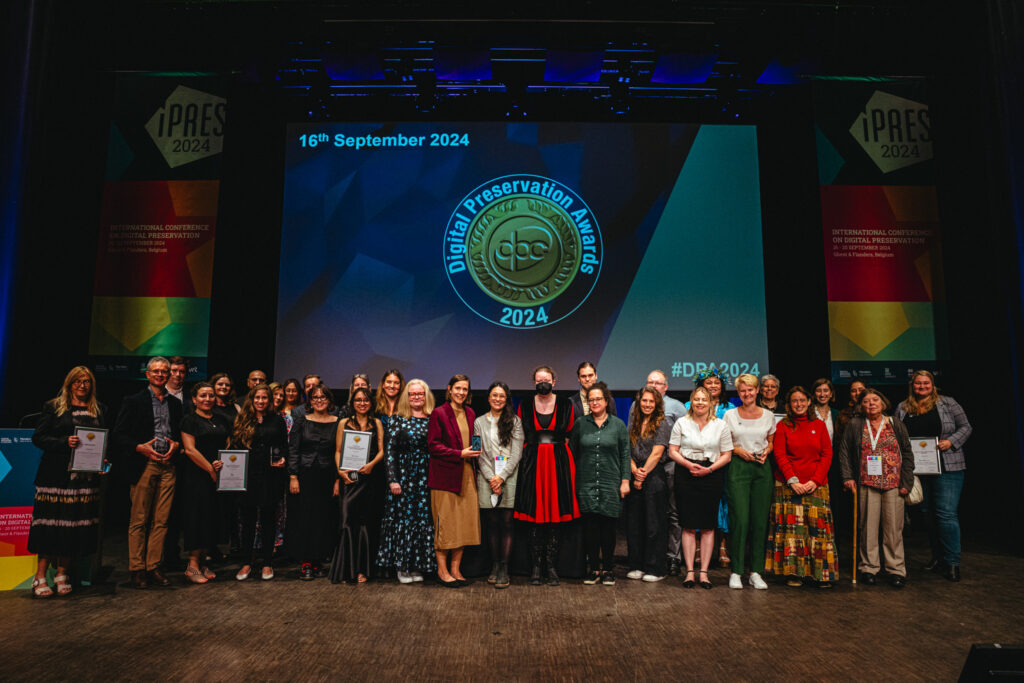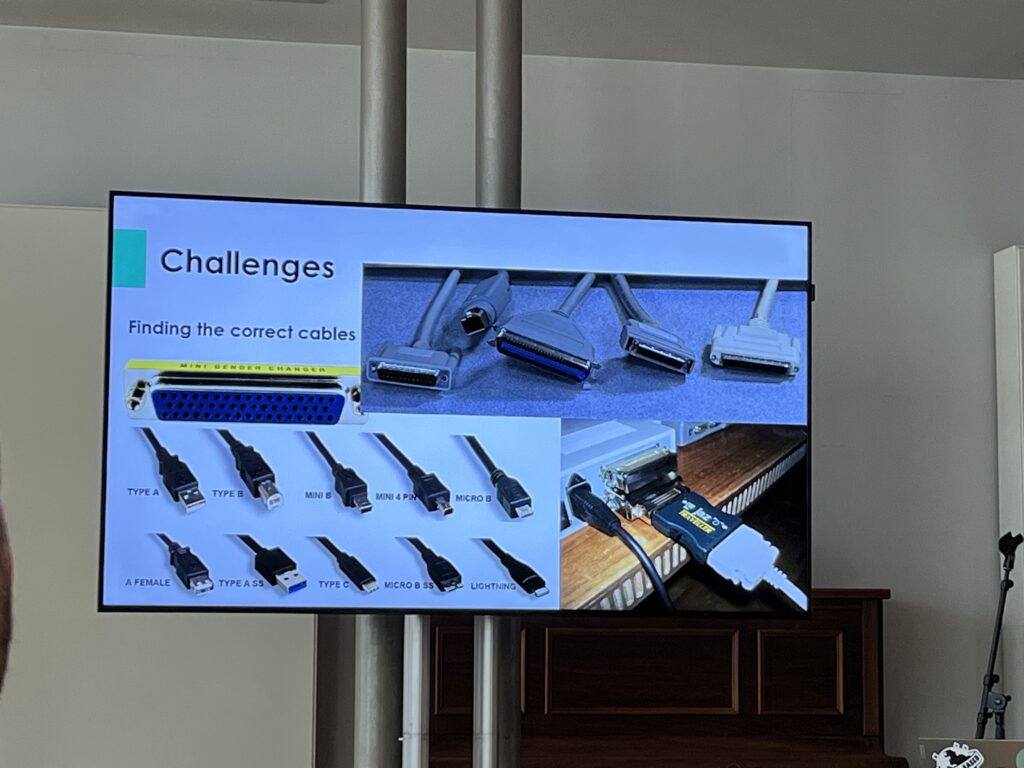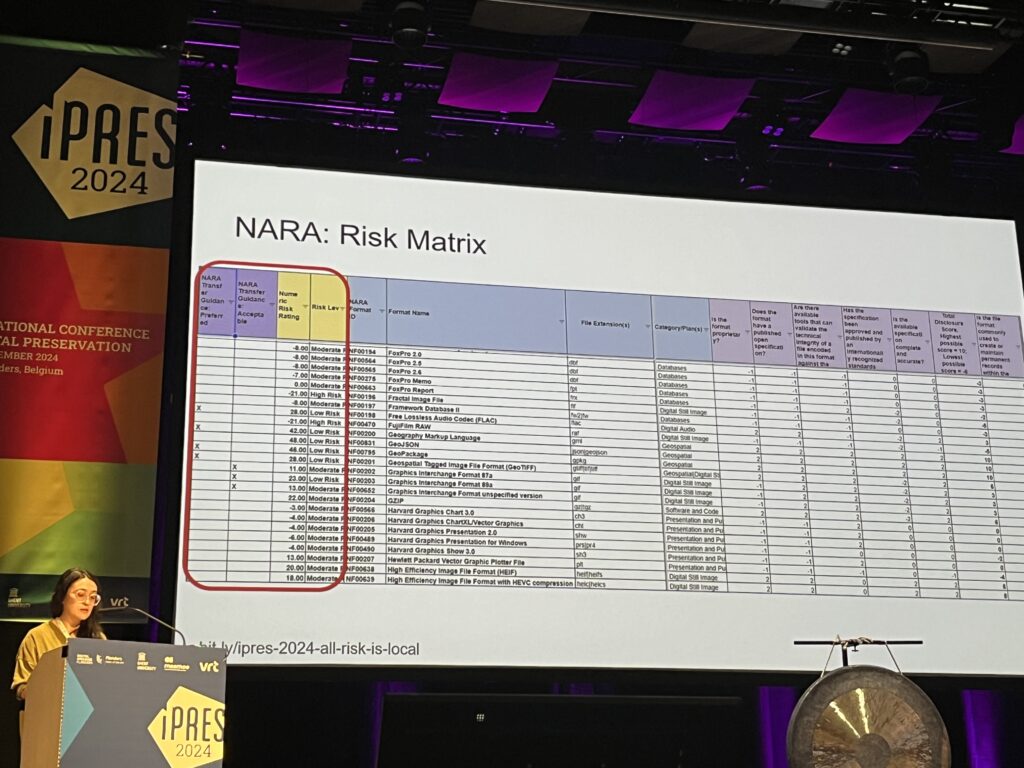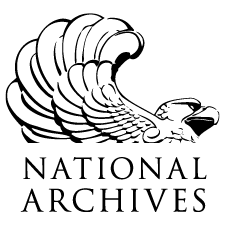This post was written by Hannah Wang, Senior Digital Preservation Specialist.
Happy World Digital Preservation Day!
World Digital Preservation Day (WDPD) is held on the first Thursday of every November. It’s a chance to connect and celebrate the people, organizations, and communities that preserve the world’s digital legacy. All day long, there are a number of events taking place across the globe to celebrate digital preservation.
This year, we are celebrating WDPD by looking back at the International Conference on Digital Preservation (iPRES 2024) that was held in Ghent, Belgium from September 16-20, 2024. NARA supported a number of staff members to attend the conference in person or virtually. Today we’re sharing iPRES 2024 highlights and takeaways from four of those staff members:
Elizabeth England, Deputy Director of Digital Preservation
Every other year, the international Digital Preservation Awards, organized by the Digital Preservation Coalition, are distributed in a ceremony that takes place at iPRES. The Awards are an important opportunity to highlight digital preservation work around the world. The 2024 Awards were particularly exciting for us, as the NDSA Staffing Survey Working Group was a finalist for an award in the International Council on Archives Award for Collaboration and Cooperation category.
The NDSA Staffing Survey Working Group is a group that I co-chaired in 2021-22 alongside Lauren Work of Yale University Library, and Hannah Wang of NARA’s Digital Preservation Unit was a contributing member. Although we didn’t win, we were honored to be a finalist among two impressive initiatives: Collaborative models of care: Preserving Australian First Nations digital cultural heritage and Kip-Agenge: Reimagining Partnerships for Digital Preservation Keiyo Indigenous Knowledge for Future Generations. We enjoyed celebrating the work of the digital preservation community and look forward to the 2026 awards!

Rebeccah Baker, Director of the Electronic Records Division
One iPRES talk that was especially relevant to helping agencies as they transfer electronic records from Microsoft 365 was Cloudy Data with a Chance of Transfer: Towards SharePoint Transfer at UK Parliament. During this session, Emily Chen discussed how the UK Parliament transitioned from on-premise storage to storing data in OneDrive and SharePoint. Emily introduced a number of challenges with this transition including: difficulty establishing an authoritative version or record copy of a file; not being able to establish fixity directly on files in Sharepoint; and that files downloaded directly from SharePoint are each unique versions with different checksums.
Emily provided a potential solution for these digital preservation issues: use the OneDrive sync feature in SharePoint to download the ZIP container file of all files in the location of interest. This process will obtain the authoritative record ensuring the checksum is always the same. Finally, Emily introduced a method for validating files extracted from the cloud through the use of additional metadata in the form of a transfer authorization report. The findings from this talk will help our Electronic Records Archivists work with agencies as they prepare to transfer their electronic records from Microsoft 365 to NARA.
Jana Leighton, Archivist in the Electronic Records Division Processing Branch
I was fortunate enough to travel to Belgium to attend iPRES 2024 in person. Highlights of the conference included attending workshops such as Working on a Budget with WANG Disks and Other Obscure Formats, presented by Leontien Talboom (Cambridge University), Elizabeth Kata (International Atomic Energy Agency), Chris Knowles (Cambridge University), and Tyler Thorsted (Brigham Young University), which touched on issues that I run into as a processing archivist in the Electronic Records Division.
During the workshop, presenters and participants discussed the increasing difficulties to source legacy hardware and resources to deal with disk formats that require additional efforts to read and extract files. Hardware like Greaseweazle and FluxEngine software were demonstrated. Hex editors and disk utility tools were demonstrated for obscure disk formats such as WANG. I work with a significant amount of Department of Education records that were often created on Macintosh computers, so I thoroughly enjoyed the discussion of Applesauce Client Software and hope to research it further.

I also enjoyed the opportunity to go on professional visits at the end of the conference. I along with about 20 other attendees made our way to Brussels to be given a tour of the KBR, the Royal Library of Belgium. It is the national scientific library that collects all Belgian publications and preserves, manages, and studies cultural and historical heritage. We toured the facility and were provided a peek at DIGIT, the Digitization Department. We spent about two and half hours learning about the history of the building and getting a rundown on the Library’s digitization efforts.
It was my fourth time attending iPRES in person and, like every time before, I came away from the conference feeling encouraged by the research being conducted and inspired about the field I work in.
Hannah Wang, Senior Digital Preservation Specialist
For this year’s iPRES, I co-authored a paper with my NARA colleagues Leslie Johnston and Elizabeth England, as well as our colleagues at the Library of Congress, Kate Murray and Ted Westervelt. The paper, All Risk Is Local: File Format Risk Assessment in Two U.S. Government Contexts, highlights the contextual factors that play into assessing file format risk at our two institutions. The Library of Congress discussed their Recommended Formats Statement and how their assessment instrument has evolved to meet changing collecting needs, while NARA discussed the evolution of our Digital Preservation Framework and how we prioritize file formats for research and risk assessment. We were thrilled that the paper was accepted, and I presented it in Belgium with Kate and Ted.

Risk assessment was a common theme throughout the conference, and I was excited to make connections between our paper and other presentations given at iPRES:
- Lu Wang from the Chinese Academy of Sciences gave a lightning talk entitled “Constructing a Preservation Technical Registry: Leveraging Community Best Practices,” where she discussed how the CAS uses NARA’s file format risk levels as factors in their own risk assessments.
- David Clipsham from Preservica gave a lightning talk entitled “An exploration of the Microsoft Compiled HTML Help (CHM) file format.” David had some resonant thoughts about the contextual factors that play into file format obsolescence: while a format may not necessarily be obsolete, it can still be functionally unusable from an organizational risk perspective, necessitating near-term risk mitigation and preservation solutions.
- Maureen Pennock of the British Library gave a presentation on her conceptual definition of digital preservation risk and associated CHARM Reference Model. This is really exciting research that ties together many of the frameworks and instruments that we use for assessing different types of risk in digital preservation (including NARA’s Digital Preservation Framework), while also making a more explicit connection between digital preservation risk and the broader field of risk science. I’m looking forward to digging deeper into her research and how we can apply it at NARA to improve our own approach to risk assessment.
Happy World Digital Preservation Day to all who celebrate! As iPRES 2024 demonstrated, there is a thriving global community of digital preservation professionals engaged in vital research and practice, and we count ourselves lucky to be part of this community.
